Nearly 1 out of 2 adults in the United States experience consistently high blood sugar levels, or hypertension, according to research conducted by the American College of Cardiology and American Heart Association. This condition puts one at risk of heart disease and stroke. And one of the most influential foods when it comes to unsteady blood sugar levels is carbohydrates.
There are two types of carbohydrates: simple carbs and complex carbs. “When you hear simple carbohydrates, think of foods that have been processed to a point where they no longer contain any fiber or protein,” says Sydney Greene, MS, RD, a registered dietitian on our medical expert board. “When eaten on their own,” she goes on to say, “[simple carbs] will cause a higher spike in blood sugar than more complex carbohydrates because they are quickly digested.”
The CDC recommends that people with diabetes (or prediabetes) should commit only half of their daily calories to carbs, as well as eat the same amount of carbs at each meal to maintain blood sugar consistency.
A lot of the time you don’t have to completely cut out the carbs you love to save your blood sugar levels from experiencing chaos. Instead, adding other components to a carbohydrate food—such as healthy fats or protein—can help balance out a meal. There are also a few easy food swaps for refined, processed carbs that will offer up more whole grains and fiber to get you on your way to controlling your blood sugar.
According to dietitians, these are the seven worst carbs that may be spiking your blood sugar levels. Read on, and for more on how to eat healthy, don’t miss 5 Best Drinking Habits for Your Blood Sugar, Say Dietitians.
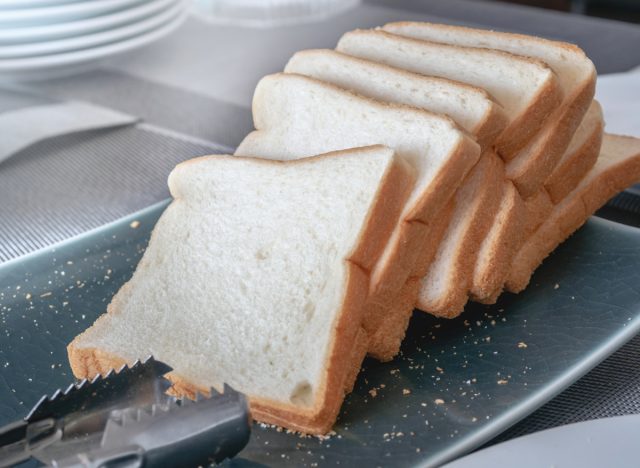

White bread is a common household staple. Many people use it to start the day off by throwing a few slices in the toaster or to get through lunchtime by building a sandwich. However, because of its high glycemic index (GI)—a measure of how quickly a food spikes your blood sugar—as soon as this carb is digested it can raise blood sugar very quickly. With a GI score of 71 (out of 100), one slice of white bread alone contributes a significant amount of glucose (or sugar) to the body’s bloodstream.
No need to toss out the loaf in your pantry quite yet. In fact, a simple addition of some healthy fats and fibers, like one’s found in avocados for example, “will slow down the rate at which blood sugar goes up,” says Greene.
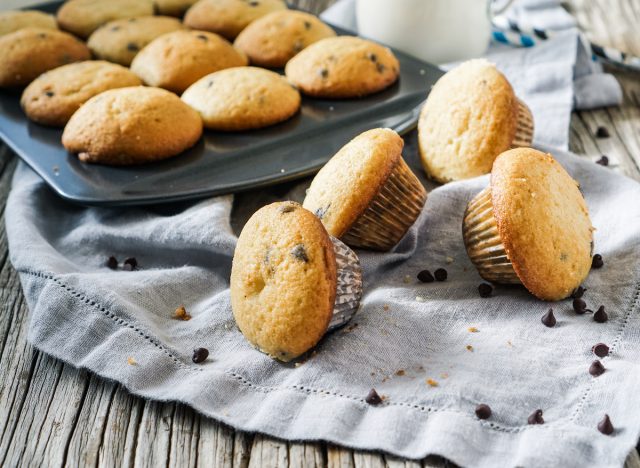

Blueberry, chocolate chip, cinnamon, and so many more. Muffins are sugar-filled pastries that can cause problems if you have high blood sugar. The sweet treat contains many simple carbs, meaning there will be rapid digestion and lots of sugar absorption, explains Greene. “To help regulate the absorption of [the] carbohydrate,” Greene suggests topping your muffin with nut butter to reap the most benefits.
One great example is peanut butter, which not only has a low GI score, but that the spread has healthy oils, protein, and fiber that can support controlled blood sugar levels.
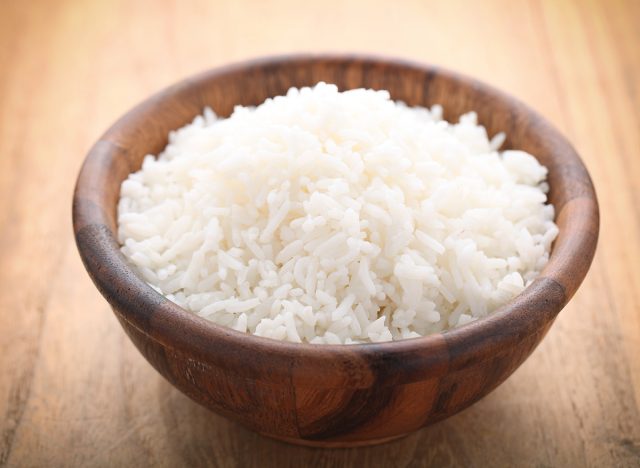

Not all forms of rice are bad, but eating too much white rice may be more harmful to some with high blood sugar. The milling process of white rice removes many beneficial nutrients the grain starts with, such as fiber. Research has shown that people who consume high amounts of white rice have a greater chance of developing type 2 diabetes as the grain has a GI of 66 or higher.
READ RELATED: Warning Signs You Have Liver Trouble Right Now
Therefore, if rice is a recurring food in your diet, Greene suggests pairing the carb with a protein—such as salmon or eggs. You can also try switching to brown rice or whole grains (quinoa) to fill in any nutritional gaps, as they are more well-rounded, complex carbohydrates.
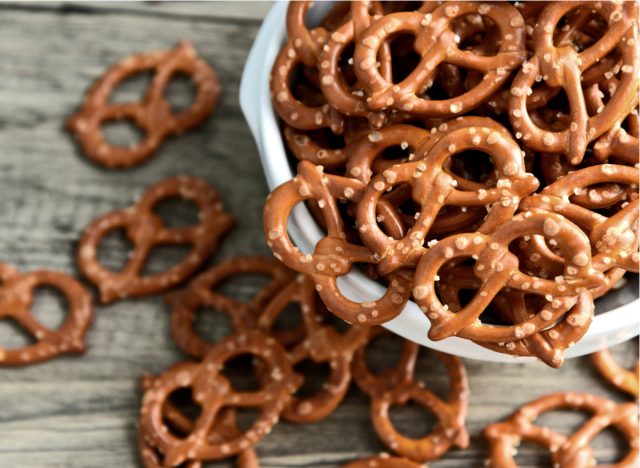

You can usually find these crunchy bites on the snack table at a party, but you may want to think about how your blood sugar might fluctuate before you dive right in. On their own, pretzels are considered refined, processed carbs that lack fiber. Eating the salty snack solo will result in unwanted amounts of glucose, and so, “those with high blood sugar [may] have more trouble with keeping blood sugars under control,” explains Molly Hembree, MS, RD, LD, another registered dietitian on our medical expert board.
However, combining pretzels with a dip can up the nutritional value in one bite. Made from chickpeas, hummus is a fantastic plant-based protein that contains healthy fats and tons of fiber to help steady digestion and manage blood sugar. One study in the Nutrition Journal found that, in comparison with white bread, hummus raised blood sugar levels four times less and did not drastically change the body’s insulin levels.
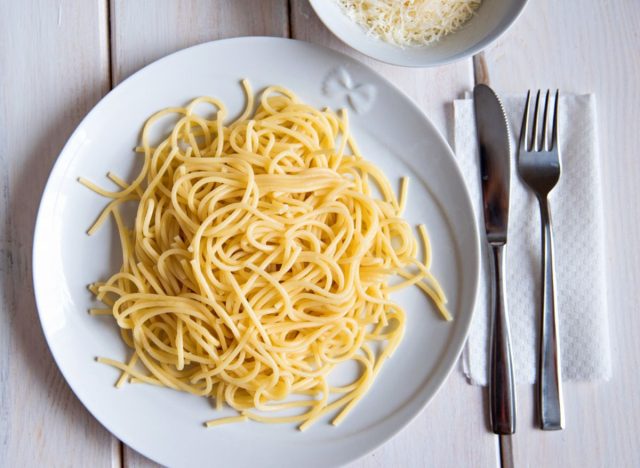

Plain pasta is another white, refined flour-based food that can cause a quick influx in the body’s blood sugar levels. Like many others on the list, pasta is high in carbohydrates and low on digestion-slowing nutrients, such as protein and fats.
“Refined starches [that] contain little to no fiber may cause blood sugar spikes,” Hembree says. You can get a more nutritious bang for your buck, by adding vegetables or beans to have equal levels of fiber alongside your carbs, she recommends.
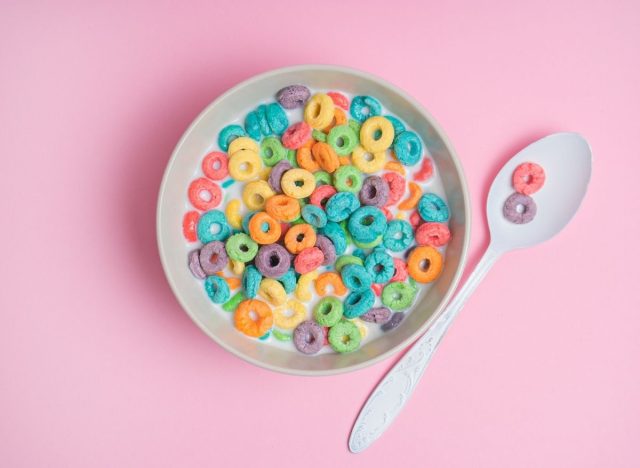

While it may seem simple enough, one of the worst things you can do for your blood sugar is eating food that is mainly sugar. Breakfast cereals—even the ones that say “healthy” on them—contain low amounts of protein, a macronutrient that can not only keep you satisfied but also help stabilize blood sugar levels.
For a better balance of carbohydrates and protein in your breakfast, swap out your sugary cereal for a bowl of oatmeal topped with fruit. This combination of whole grains and berries offers fiber, protein, and a more reasonable amont of carbohydrates that will digest slower and more safely in terms of blood sugar. Plus, with the addition of berries, you won’t have to give up a sweet, flavorful meal.
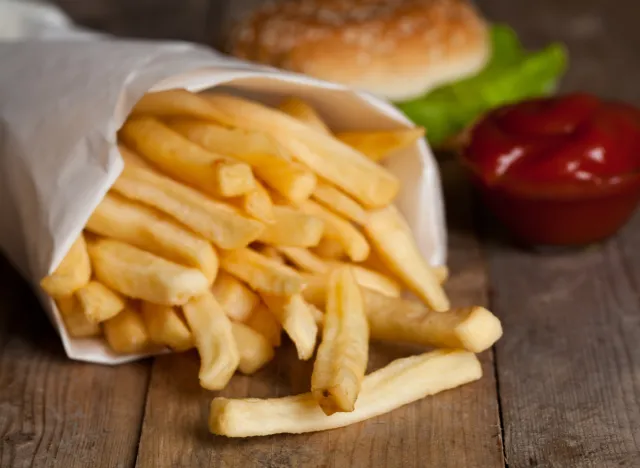

Technically, french fries do come from a vegetable—potatoes—but they are a high-carb food that can cause chaos to one’s blood sugar. French fries can be high on the glycemic index, with a GI as high as 82, forcing your body to absorb the food far too fast and see blood sugar levels sky-rocket, Hembree explains. According to Harvard Health, one cup of potatoes has similar effects on blood sugar as drinking a can of soda. Plus, once they’re boiled, deep-fried, and covered in salt, the damage can extend from your blood sugar to your waistline and even blood pressure.
A lot of people swap this staple side with sweet potato fries, as they are full of vitamin C, potassium, and a solid amount of fiber. Plus, sweet potatoes have a lower glycemic index of 64, which makes them a “medium-level carbohydrate” in terms of blood sugar balance. That being said, sweet potato fries are still deep-fried like regular fries, so if you’re concerned about your blood sugar levels, consider a baked sweet potato instead.
Source:








